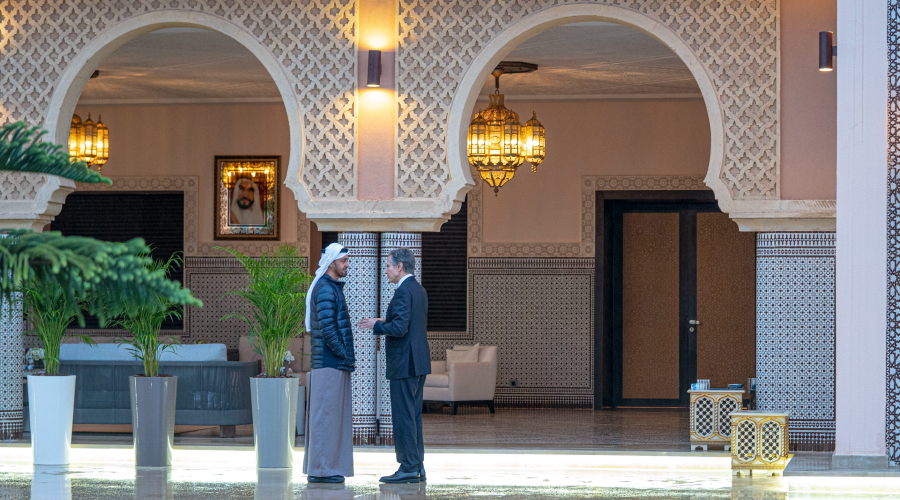The Ukraine Strain in the U.S.-UAE Partnership
The Russian invasion shows how the relationship between the United States and the UAE is changing—but also how it will remain the same.

Published by The Lawfare Institute
in Cooperation With

Editor’s Note: Russia’s invasion of Ukraine is rippling around the world. In the Middle East, U.S. efforts to gain the support of allies have met with at best limited success, undermining the Biden administration’s efforts to prevent energy prices from soaring, among other goals. Dina Esfandiary of the International Crisis Group explains the ramifications of the Ukraine conflict for the U.S. relationship with the United Arab Emirates, a longtime ally that has increasingly charted its own path in the Middle East in defiance of U.S. objectives.
Daniel Byman
***
Differences between the United Arab Emirates and the United States are growing, placing strain on a once-strong partnership. The conflict in Ukraine has exacerbated tensions and made the UAE’s frustration and discontent with the United States more obvious. While the tone of their relationship will continue to change—likely for the worse—the fundamentals will not. Both sides continue to need one another, at least for now.
Iraq’s invasion of Kuwait in 1990 marked the beginning of a close security relationship between the United States and the Gulf Arab states. It was also the beginning of the U.S. presence in the region, including at Al Dhafra Air Base in the UAE. The two countries built economic and political ties, and the UAE became an indispensable partner. While 9/11 and the U.S. invasion of Iraq temporarily shook that relationship, it did not change the trajectory of ever-increasing ties between the United States and the UAE.
This close relationship began to come apart in the aftermath of the Arab uprisings of 2011. The way the Obama administration abandoned Egypt’s Hosni Mubarak, a longtime U.S. ally, frightened them, especially as Arab autocrats seemed to be falling quickly to popular uprisings. Gulf Arab elites also feared that the United States wanted to leave the Middle East. Shortly after the uprisings began, the Obama administration announced a “pivot” to Asia and failed to uphold a red line it had set for Syria’s President Bashar al-Assad on the use of chemical weapons. The 2015 nuclear deal signed between six world powers (the United States, the United Kingdom, France, Germany, Russia and China) and Iran made the Gulf Arab states even more nervous; they believed it gave Iran legitimacy and the means to pursue its expansionist regional agenda.
No matter what the United States did—and no matter how frequently or forcefully it reiterated its commitment to the security of the region—the feeling remained among Gulf allies that Washington cared little about them and that the U.S. presence was on its way out in any event. Frustrations only grew, especially as successive U.S. administrations stated that they were tired of dealing with a Middle East embroiled in conflict that was a drain on U.S. resources. President Biden, for his part, announced an end to U.S. support for the Saudi-led coalition in Yemen shortly after stepping into office, suspended some arms sales to the region and initially called only Israel.
This U.S. shift prompted a realignment of Emirati foreign policy: The UAE decided to become more assertive and more proactive, and began pursuing greater economic, political and military self-sufficiency. The more assertive the UAE became, however, the more this aggravated its relationship with the United States.
Initially, the UAE involved itself in regional and international crises as a part of Western-backed coalitions—alongside NATO in the Balkans in the 1990s and Afghanistan in the 2000s—and always made sure to keep its partners in the loop about its role and broader foreign policy. But gradually, it started to pursue its interests more forcefully and independently, in some cases even neglecting to notify its partners when it did. In 2014, for example, the UAE, fighting alongside Egypt, carried out airstrikes in Libya that took Washington by surprise. The UAE’s greater autonomy of action and increasing willingness to go against what its partners wanted attracted greater scrutiny of its foreign policy. As a result, the UAE’s image took a hit. For example, the U.S. Congress and Senate took a greater interest in what the UAE and its Saudi ally were doing in Yemen following reports of indiscriminate attacks on civilian areas and more general widespread civilian suffering, and even tried to block the sale of weapons to Abu Dhabi several times.
The Russian invasion of Ukraine made things worse. The UAE’s Western partners have firmly backed Ukraine, asking others to take a stand against Russia. But this position has been poorly received in the UAE. The UAE has been building ties—economic and political—with Russia in an effort to diversify its relationships. Emirati officials likened the crisis to a “new Cold War” and pointed to the glaring double standard by which the West asked the UAE and its allies not to involve themselves in their own regional conflicts but then seemed to back their own citizens’ efforts to go fight in Ukraine and increased their official involvement in the conflict. The UAE embarked on a delicate balancing act, unwilling to side with its Western partners in public discourse for fear of antagonizing Russia but also careful to demonstrate that it did not support the invasion, primarily by voting alongside its partners in U.N. General Assembly resolutions on the Russian invasion.
The UAE has also used the Ukraine crisis as an opportunity to display its growing frustration with its U.S. partner. It refused to condemn the Russian invasion and later refused to increase oil production, along with Saudi Arabia, following requests from the United States and the United Kingdom to offset reduced Russian exports. Instead, it promised to help but ultimately stuck to the production caps it had previously agreed to through OPEC. This frustrated U.S. officials, who jumped between anger at their regional partner for refusing to follow suit and a desire to appease Abu Dhabi in the hope that it would yet deliver on the request. As part of this, U.S. Secretary of State Antony Blinken, during a visit in March, reportedly offered a belated apology to Abu Dhabi Crown Prince Mohammed bin Zayed for what the UAE considered the inadequate U.S. response to Houthi attacks targeting the UAE earlier in the year. The apology apparently did little to mollify the Emirati leadership.
Washington is wrong to try to placate its Emirati partners by just issuing apologies. Abu Dhabi is angry and frustrated, and the more the United States indulges this, the more it legitimizes the UAE’s exaggerated sense of abandonment. After all, the United States continues to work with and defend the UAE as a key partner in the region—including through security and intelligence cooperation, especially following the Houthi attacks earlier this year. In the end, the U.S. response does little to change the minds of the leadership in Abu Dhabi, or their policies. Washington must accept that the UAE cannot be swayed as easily as in the past; it will follow its own interests, and its policies will at times be at odds with those of its Western partners, causing unease. The United States cannot expect the UAE to support all U.S. policies in the Middle East and beyond anymore, especially when U.S. objectives differ from Emirati ones.
The UAE is also wrong in its approach to the relationship. Abu Dhabi completely ignores the baseline U.S. support it receives, taking it for granted and expecting more. After the Houthi attacks against sites in the UAE in January and February, the United States sent a frigate and jet fighters, and shared intelligence on Houthi launch sites—a significant show of support. But for the UAE, the U.S. response was not enough; in fact, an Emirati official said, it was “disappointing”—but did not specify what more the United States should have done.
Ultimately, the relationship is unlikely to fundamentally change. The United States continues to consider the UAE a strong and capable—though perhaps somewhat less reliable—partner in an unstable region. For its part, the UAE continues to need its U.S. partner and the security umbrella it provides, even as the UAE seeks to diversify its relationships. So, while frustrations will continue to simmer, the relationship will remain broadly the same at its core—but it will no longer look like it did before the Arab Spring.





